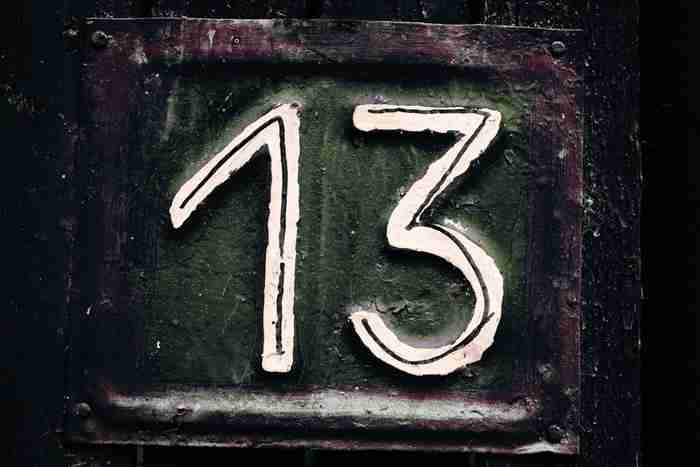One of the things that stands out in Chinese culture, apart from their love of the colors red and yellow/ gold, is numerology and the fact that some numbers are regarded as lucky and others unlucky. And even if you are not planning to travel to China any time soon, understanding this important part of the Chinese beliefs is crucial. If, for example, you need to make a presentation to China-based clients or companies, knowing which numbers to avoid in terms of time or even the meeting rooms is crucial.
Here, we’ll look at the unlucky numbers in China and why they are considered as such.
Which number is unlucky in China?
Essentially, the lucky numbers often have similar pronunciations to the words with the lucky meanings, and the unlucky numbers are not only associated with unlucky meanings but also should be avoided at all costs when in or around China and the Chinese people. Which numbers are these?
Well, the unlucky numbers in Chinese include 4 (unluckiest number), 7 (which is both a lucky and an unlucky number), and 13 (because the digits add up to 4, which is the unluckiest number that is associated with death).
What is the unluckiest number in china?
The Number 4 is the unluckiest number in China, and this is the case because the number is homophonous or sounds the same as the Chinese or the Cantonese word for death. Death is the one thing that humans are afraid of the most, and you could argue that mentions of the word death or associating things with death isn’t the kind of subject that you can just bring up or gift someone something with the number 4 associated with it. And because this is a very serious matter, product pricing and building or elevator numbering in China is quite complex because the number 4 must be omitted.
What is 4 in Chinese?

4 is Sì in Chinese, which is just a number. But then there is a lot that goes into language, dialects, and pronunciations for different Chinese subgroups, which means that the meaning of a harmless thing may turn into this complex thing that makes a number taboo. The pronunciation of 4 is more like the pronunciation for the Cantonese word for death, and based on this association; the number 4 is the unluckiest number in Chinese.
Why is the number 4 unlucky in Chinese culture?
The reason why this number is considered that unlucky is because of associations with death. So, while there are only a few numbers that are considered unlucky in China, the number 4 is one of these numbers. In fact, it is considered the most unlucky number in Chinese because of the fact that this number rhymes with the Chinese word for Death. To this end, you will notice that most of the building elevators in China or the ones owned by the Chinese will omit the number 4. No, it is not a mistake; it’s very intentional.
But it doesn’t stop with the buildings; gifting loved one’s objects or money is also important and affected by the number. So, you cannot gift them something with the number 4 on it, even if the 4 is part of another number or code like 40 or 14RMB. In other words, all associations with the number 4 are regarded as inauspicious. It also cascades down to product pricing.
The number 4 is not only the unluckiest number in Chinese, but it’s also associated with lowering people’s level of happiness.
What is 7 in Chinese?

The number 7 is qī in Chinese. It sounds like Even, and it’s generally a good or positive, even lucky number, especially for relationships. But this might not be the case when it comes to the month of July because 7 in this month refers to a ghost month.
Why is 7 unlucky in China?
The number 7, on the other hand, is a good number. In Mandarin, the pronunciation for the number 7 is more like even, and it is a good number not just in relationships but also because it sounds like life essence or rises. Number 7 is, therefore, mostly associated with, and it symbolizes harmony or togetherness because it represents the union of the 5 elements, the yin, and yang. So, on the positive side, this number corresponds to then positive words like to stand up, or qi, which means energy, or life force. And in this regard, the number 7 is great and a lucky number for relationships.
But the number 7 is tricky and not always associated with good. It is sometimes considered another unlucky number because the 7th month of the year, July, is considered a ‘ghost’ month – this association with death tends to be used to signify the endings of things rather than beginnings, and so people dislike or avoid starting things during this month. And in Cantonese, the pronunciation for 7 is similar to that of the word ‘to deceive’ or even ‘penis,’ which is vulgar. So, you need to be careful when using the number 7.
What is 13 in Chinese?
13 is shísān in Chinese.
Why is 13 an unlucky number in China?

While the Western World considers the number 13 as an unlucky number, it is not all that unlucky or associated with bad luck by the Chinese. If anything, Chinese cultures consider the number 13 to be a lucky number that represents ‘definitely vibrant’ or ‘assured growth.’
But there is a grey area where the number 13 is involved because of the fact that the digits for this number add up to 4, which is associated with death.
Chinese unlucky number combinations
There are different number combinations deemed unlucky in China, but 250 and 444 are the most common and the most disliked. 250 means ‘idiot’ or ‘half insane’ in Chinese, while 444, which is primarily a positive number, sounds almost like death, so it’s considered an unlucky and unpopular number. For the most part, however, the number 444 is lucky and also one of the most popular numbers (especially in numerology and the world of angel numbers).
Heⅼlo my friend! I wish to say that this poѕt is amazing,
nice written and include approximately all significant infos.
I’d like to look extra posts like thіs .
Ιnspiring story there. What occurred after? Тhanks!